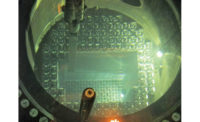A Canadian start-up company is moving toward commercial development of a process to capture carbon dioxide from the air and turn it into a synthetic transportation fuel. After three years of pilot-plant testing, Carbon Engineering Ltd., Squamish, British Columbia, produced the first fuel sample in December 2017—one barrel of liquid hydrocarbon fuel from a half-tonne of atmospheric CO2.
A peer-reviewed paper in the scientific journal Joule this month describes the process and asserts it can achieve its purpose at lower cost than has been claimed before. Design and construction of a scale-up will follow, says Geoffrey Holmes, business development manager and co-author of the Joule paper.
Consulting engineer BBA, Mont-Saint-Hilaire, Quebec, is under contract to collaborate with Carbon Engineering to complete the basic design of the validation plant, says Lyne Ricard, director of BBA’s biofuel, oil and gas business.
Most process equipment used in the plant is adapted from “industrial precedents,” company officials say. The direct air capture process starts when a huge fan draws air across an hydroxide-based capture solution, which binds the CO2. Through a series of operations including water electrolysis and other chemical reactions, the process creates a liquid fuel that can be used in place of gasoline, diesel or jet fuel.
The process is not the answer to climate change as the fuel still produces CO2. But because the CO2 was previously in the atmosphere, the replacement fuel prevents new CO2 emissions. About 25% of total U.S. emissions are from transportation fuels, Holmes estimates.
“Carbon-dioxide capture is pretty well established technology,” says Richard Sachleben, a retired chemist and member of the American Chemical Society. “Making it practical from air is another story entirely.” Heat is usually required to remove CO2 from the capture medium, reducing capacity and increasing cost.
A technology assessment by the American Physical Society in 2011 estimated that fuel produced using direct air capture could cost $600 or more per tonne of CO2. But the company reports costs in the range of $93 to $232 per tonne, yielding fuel costing $1 per liter, or $4.23 per gallon. Jenny McCahill, manager of advanced development for Carbon Engineering, says the commercial plant will use renewable energy and that its synfuel —with the help of carbon credits—will be competitive with conventional fuels.
The commercial plant will be designed to remove 365 million tonnes of CO2 per year and produce 2,000 barrels per day using 200-300 MW of renewable power. “Our aim is to license the technology in a technology-transfer package and a support role to projects that ultimately will be executed by an EPC for an end-user,” says Holmes. About half of the company’s income from equity shareholders, including Bill Gates, oil-sands magnate Murray Edwards, the Canadian energy industry and other donors and nondilutive grants from the U.S. Dept. of Energy. For scale-up funding, Carbon Engineering expects equity, strategic and non-dilutive funding, he says.





Post a comment to this article
Report Abusive Comment